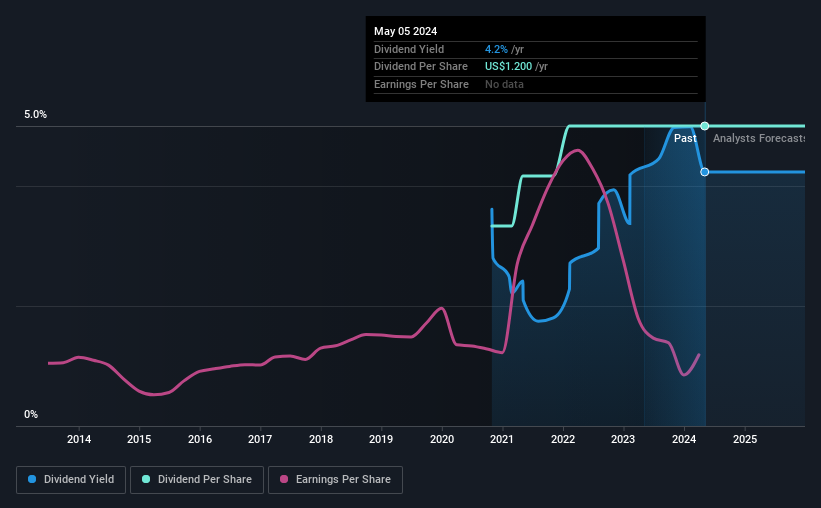Regional Management (NYSE:RM) Is Due To Pay A Dividend Of $0.30
Regional Management Corp. (NYSE:RM) has announced that it will pay a dividend of $0.30 per share on the 12th of June. This means the annual payment is 4.2% of the current stock price, which is above the average for the industry.
Check out our latest analysis for Regional Management
Regional Management's Earnings Easily Cover The Distributions
A big dividend yield for a few years doesn't mean much if it can't be sustained. Based on the last payment, Regional Management was quite comfortably earning enough to cover the dividend. This indicates that quite a large proportion of earnings is being invested back into the business.
The next year is set to see EPS grow by 47.6%. If the dividend continues along recent trends, we estimate the payout ratio will be 46%, which is in the range that makes us comfortable with the sustainability of the dividend.
Regional Management Doesn't Have A Long Payment History
The dividend has been pretty stable looking back, but the company hasn't been paying one for very long. This makes it tough to judge how it would fare through a full economic cycle. Since 2020, the annual payment back then was $0.80, compared to the most recent full-year payment of $1.20. This implies that the company grew its distributions at a yearly rate of about 11% over that duration. It is always nice to see strong dividend growth, but with such a short payment history we wouldn't be inclined to rely on it until a longer track record can be developed.
Dividend Growth May Be Hard To Come By
Investors who have held shares in the company for the past few years will be happy with the dividend income they have received. Unfortunately things aren't as good as they seem. Regional Management has seen earnings per share falling at 5.2% per year over the last five years. A modest decline in earnings isn't great, and it makes it quite unlikely that the dividend will grow in the future unless that trend can be reversed. Earnings are forecast to grow over the next 12 months and if that happens we could still be a little bit cautious until it becomes a pattern.
In Summary
Overall, it's nice to see a consistent dividend payment, but we think that longer term, the current level of payment might be unsustainable. The company is generating plenty of cash, which could maintain the dividend for a while, but the track record hasn't been great. This company is not in the top tier of income providing stocks.
Investors generally tend to favour companies with a consistent, stable dividend policy as opposed to those operating an irregular one. Still, investors need to consider a host of other factors, apart from dividend payments, when analysing a company. For example, we've identified 4 warning signs for Regional Management (1 is potentially serious!) that you should be aware of before investing. If you are a dividend investor, you might also want to look at our curated list of high yield dividend stocks.
Have feedback on this article? Concerned about the content? Get in touch with us directly. Alternatively, email editorial-team (at) simplywallst.com.
This article by Simply Wall St is general in nature. We provide commentary based on historical data and analyst forecasts only using an unbiased methodology and our articles are not intended to be financial advice. It does not constitute a recommendation to buy or sell any stock, and does not take account of your objectives, or your financial situation. We aim to bring you long-term focused analysis driven by fundamental data. Note that our analysis may not factor in the latest price-sensitive company announcements or qualitative material. Simply Wall St has no position in any stocks mentioned.

 Yahoo Finance
Yahoo Finance 
